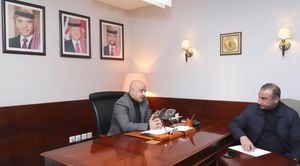El Salvador stands at the crossroads of economic ambition and environmental responsibility as its influential Catholic Church voices strong opposition to efforts aimed at lifting the country’s ban on gold mining. The archbishop of San Salvador, José Luis Escobar Alas, has expressed grave concerns about the potential ramifications of such action, stating emphatically, "It will damage this country forever."
This heartfelt plea from the church echoes sentiments shared by various civic and environmental groups who warn of the irreversible harm to the nation’s rich natural resources. Their arguments revolve around the dangers posed to water systems, the potential for contamination, and the broader health impacts on local communities.
President Nayib Bukele, known for his unconventional approach to governance, has called the seven-year-old ban on gold mining "absurd". He argues for the exploitation of untapped mineral resources as key to transforming El Salvador’s economy, fostering wealth along the lines of modern economic practices. During his recent discourse on social media, Bukele suggested mining could significantly contribute to the country’s prosperity.
The initial ban on gold mining, enacted back in 2017, was propelled by widespread consensus, including support from various sectors, both civic and religious. The ban's purpose was clear: to safeguard El Salvador’s precious water resources, which are particularly vulnerable to contamination from mining activities. The decision was also spurred by intensive studies demonstrating the potential environmental hazards associated with mining operations.
Despite claims of "green mining" technologies purported to minimize environmental impact, critics remain skeptical. Members of the Alliance Against the Privatization of Water, alongside many environmentalists, point out the severe health risks tied to mining, including respiratory diseases and kidney-related issues. Amalia López, a well-known representative of the Alliance, remarked, "It's not true there's green mining; it's paid for with lives, kidney, respiratory problems, and leukemia. These effects aren't immediate but can devastate communities over time."
Fears surrounding water contamination highlight the fragility of El Salvador's ecosystem. Mining is typically water-intensive, demanding large volumes of water not just for operational processes but also for managing the hazardous runoff from mining activities. This poses significant challenges, particularly for communities already struggling with access to clean water.
San Salvador's archbishop has taken the opportunity to align the Catholic Church firmly against the lifting of the ban. He implores the government to reconsider its plans, emphasizing the need for sustainable approaches to economic development—approaches which prioritize the welfare of the environment alongside economic benefits.
While it’s evident the church's influence remains strong within local society, the political arena's dynamics present challenges. Bukele’s political party commands substantial power within Congress, leading experts to speculate about the ease of passing legislation aimed at overturning the mining ban. This political clout, coupled with the waning strength of opposition parties, could facilitate changes without significant resistance.
The renewed push by Bukele for mining practices has been described as a marked departure from his original stance during his campaign for the presidency, wherein he expressed support for the ban on metallic mining. Observers note this shift might reflect the increasing pressure on his administration to bolster economic performance amid global economic volatility.
Overall, the upcoming months will be pivotal. The Catholic Church, together with environmental organizations, remains vigilant, urging the public and government alike to idealize sustainable practices over potentially hazardous economic ventures. "The church is asking people to reflect on the long-term impacts of their choices on our sacred lands and resources," concluded Archbishop Escobar Alas.
El Salvador's battle over its natural resources symbolizes broader global conflicts between economic development and environmental stewardship. The outcomes of this contentious debate may very well set precedent for future governance not only within El Salvador but also across countries grappling with similar challenges.



